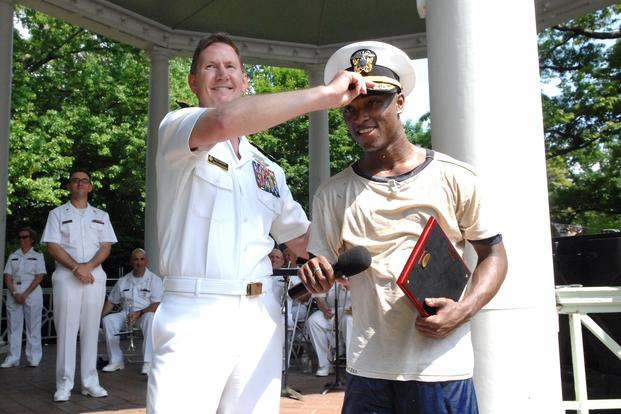This editorial is written by Vice Adm. Walter "Ted" Carter, the Superintendent of the United States Naval Academy in Annapolis, Md. Carter is a 1981 graduate of the Academy and the former President of the United States Naval War College.
Over the course of my first year as the Naval Academy Superintendent, I have had the privilege to speak publicly about our mission of this institution and the development of future leaders of character and consequence. As I have traveled across the United States, I have been struck by the positive embrace our American citizens give to not only our midshipmen but to our military writ large for all that they do. Recently, there has been a public conversation about the value of service, as well as the relationship between the less than 1percent who wear the military uniform and the 99 percent of Americans they serve.
The American public routinely thanks uniformed service members for the job they do. "Thank you for your service" is the usual phrasing, and it is a polite and respectful thing to say to anyone who serves. I've been thanked many times, and usually I feel slightly embarrassed and thank the person who thanked me right back, privately humbled and mindful of those whose service has cost them more physically than mine has cost me. Recently, there have been some service members who have said publicly that they prefer not to be thanked for their service, believing most Americans can't appreciate how deep their sacrifices have been. How can we remove some of the uneasiness from this interaction, both for service members and for those giving thanks?
Since 1973, our military has been an all-volunteer force comprised of men and women who have chosen to protect our country, whether by fighting wars or by sustaining peace. What makes them different from those in other professions is that each service member takes an Oath of Office. They don't swear allegiance to a person, but rather to the concepts outlined in our Constitution. By swearing to "support and defend the Constitution against all enemies, foreign and domestic," they volunteer to protect the freedoms of all Americans. Giving thanks to those in uniform is valuable, even though all of us feel that doing our patriotic duty is simply our job. Just like every American returning home from deployment or conflict over the course of U.S. history, we want to feel welcome. For most of our recent past, we have felt that way. The period in the late 60's and early 70's is an exception, as many Americans disagreed with our foreign policy and blamed the military men who were drafted to execute the fighting.
Today, public sentiment -- while not always universally supportive of any given military effort - generally favors the men and women who choose to serve. All veterans, whether bearing visible signs of battles fought or those who bear the invisible effects of war, have earned the respect of a grateful nation. "Thank you for your service" is a sound first step in acknowledging the sacrifices our bravest men and women make, but in some cases, it can be misinterpreted. The phrase's ubiquity is emblematic of the healthy, mutually respectful relationship between the American public and its military, but that same ubiquity can also dilute and depersonalize a statement intended to be heartfelt.
So, how to better thank those who serve? How should the public express its gratitude to the smallest fraction of the American population that has sworn to defend America's Constitution since before World War II? "Thank you for your service" is not wrong, but it does not capture the dynamic which makes voluntary military service unique. The military serves the public, to be sure, but most importantly, it protects the public through its defense of the Constitution. Rather than focusing on mere service, I submit that "Thank you for protecting my freedom" might be a more personal and more accurate way to express gratitude to those who have taken the Oath.
How should men and women in uniform respond when offered such thanks? Whether someone says "Thank you for your service," or "Thank you for protecting my freedom," military members should consider responding with "Thank you for your trust." Implicit in the Oath of Office is the trust of the American people whom we serve. The American people trust us to support and defend the Constitution for them. Instead of shrinking from the compliment or simply giving thanks for thanks given, we instead owe our fellow Americans gratitude for trusting us to provide our service. America's trust is crucial as the military's role evolves to confront continued security challenges around the globe.
Maintaining the public's trust will be paramount amidst potential future drawdowns and budget fluctuations. Whether our nation directs its Soldiers, Sailors, Airmen, Marines, and Coast Guardsmen to actively engage enemy threats or to stand the watch to maintain peace and security, our military must continue to earn this trust as it ensures the safety and freedom of our citizens. To the men and women who have taken the Oath: Thank you for protecting my freedom. And to anyone who would offer thanks to our fellow service members: Thank you for your trust. That trust is the real reason our military, and our Navy-Marine Corps team, is the best the world has even seen.






























